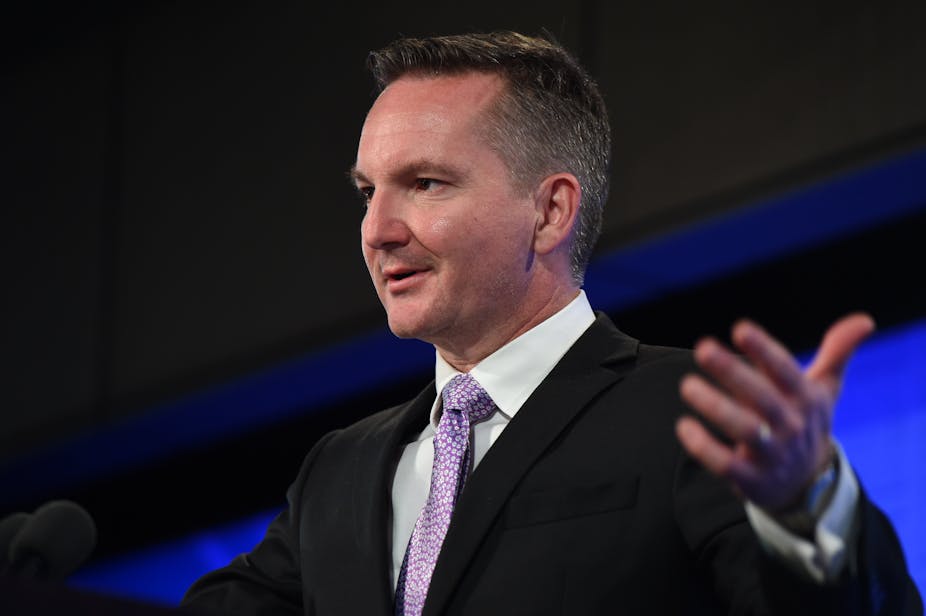Chris Bowen presented at the National Press Club on Tuesday as a well-prepared alternative treasurer, who could slot into the real job very easily if July 2 brought the chance.
“Neat” is the word that came to mind about Bowen’s performance. His critique of the government was strong but not over the top; he firmly linked Labor’s large school spending plan to its economic story; above all, he sounded responsible.
Bowen has done much of the work on Labor’s robust tax and other economic policies, and defends them with confidence. He also was treasurer, albeit briefly, in the last days of Labor, and that experience shows. If Labor won, Bowen would be in the unusual position of having already been road-tested in the job.
Despite any of this, Bill Shorten and Bowen face a big challenge to convince people they are up to the economic management task. In a March Newspoll Malcolm Turnbull had a commanding lead over Shorten as the one more capable of managing the economy – 54-20%.
In Tuesday’s Essential poll, when people were asked who they would trust most out of Scott Morrison and Bowen to handle Australia’s economy, 31% said Morrison, 20% Bowen, and 49% didn’t know. Morrison had improved from plus three to plus 11 since April.
This was regardless of more people disapproving than approving of the budget (29-20%), and 32% saying it made them less confident in the government’s ability to manage the economy while only 21% felt it made them more confident. Just to confuse the picture further, people liked many of the budget’s individual measures. For example 62% approved capping tax concessions for those with more than A$1.6 million in superannuation, and 50% gave a tick to reducing company tax.
In his Tuesday speech Bowen highlighted the need to preserve Australia’s AAA credit rating – which Moody’s has recently brought into question, suggesting it was not just spending but revenue that needs to be addressed.
Labor’s potential vulnerability is its spending program. Bowen confronted this directly. “I don’t see budget repair and defending the AAA credit rating as a competing objective with investment in schools, infrastructure and hospitals,” he said. “I see them as complementary and essential parts of a real plan for economic growth.”
Underlining the importance of the AAA rating, he said a loss of it from one or all of the three agencies would increase the cost of government borrowing. “Now as a progressive alternative treasurer who wants to fund investments in schools, hospitals and infrastructure, I want to have that money available, not being wasted on payments to bond holders.”
He said a Labor administration would have an economic statement (aka mini-budget) within its first three months “to reflect the new government’s priorities and approach”.
As part of the new way under Labor, it would remove the preparation of the economic forecasting for the budget from Treasury, and have it done by the Parliamentary Budget Office (PBO), a body that at the moment mostly does costings at the request of the opposition, Greens and other minor players.
Treasury’s forecasts and projections are perennially questioned and Bowen as well as some commentators doubt those in this year’s budget. Often Treasury gets the numbers wrong. Sometimes critics see the forecasts as influenced by the government of the day.
Bowen said that having the PBO do this work “will ensure that economic forecasts are undertaken at arm’s length from government, giving the public more confidence in the budget process”. This sort of system operates in Britain where the Office for Budget Responsibility does the forecasts.
The PBO is a highly credible body, which has done a terrific job and removed much of the dispute about costing of election promises. It’s also true that the Bowen change would remove the grounds for accusations of political fiddling with the figures.
On the other hand, the problem that there is perceived political interference could surely be addressed by a treasurer making a firm declaration that there would be no massaging of Treasury figures.
Economist Saul Eslake describes the Bowen proposal as “a bit of a gimmick”, saying that “there is no reason why [the PBO’s] forecasts would be any better or worse than Treasury’s”.
To cope with the extra task the PBO would have to be expanded – many of the additional staff would probably be drawn from Treasury.
Labor’s economic team is well qualified for its assault on the budget. It includes former economics professor Andrew Leigh, who is shadow assistant treasurer, and Jim Chalmers, who worked for former treasurer Wayne Swan.
Leigh is chipping at the political salience of one important budget number, the estimate that the ten-year tax package would produce 1% growth in Australia’s GDP. Drawing on some Treasury modelling, Leigh is arguing that little of the claimed boost to growth will flow through to households.
On the modelling, a reduction in company tax from 30% to 25% produces a 0.1% increase in household welfare. This is because much of the benefit goes to foreign shareholders.
“If the proposition being put to Australian households is ‘you’ll get an extra 0.1% in exchange for not being able to fund your hospitals and schools’, I’m not sure many Australians would find that an attractive deal, particularly if it came along with a downgrade from Moody’s,” Leigh told Sky – in a combination of populist and high-end economics.

